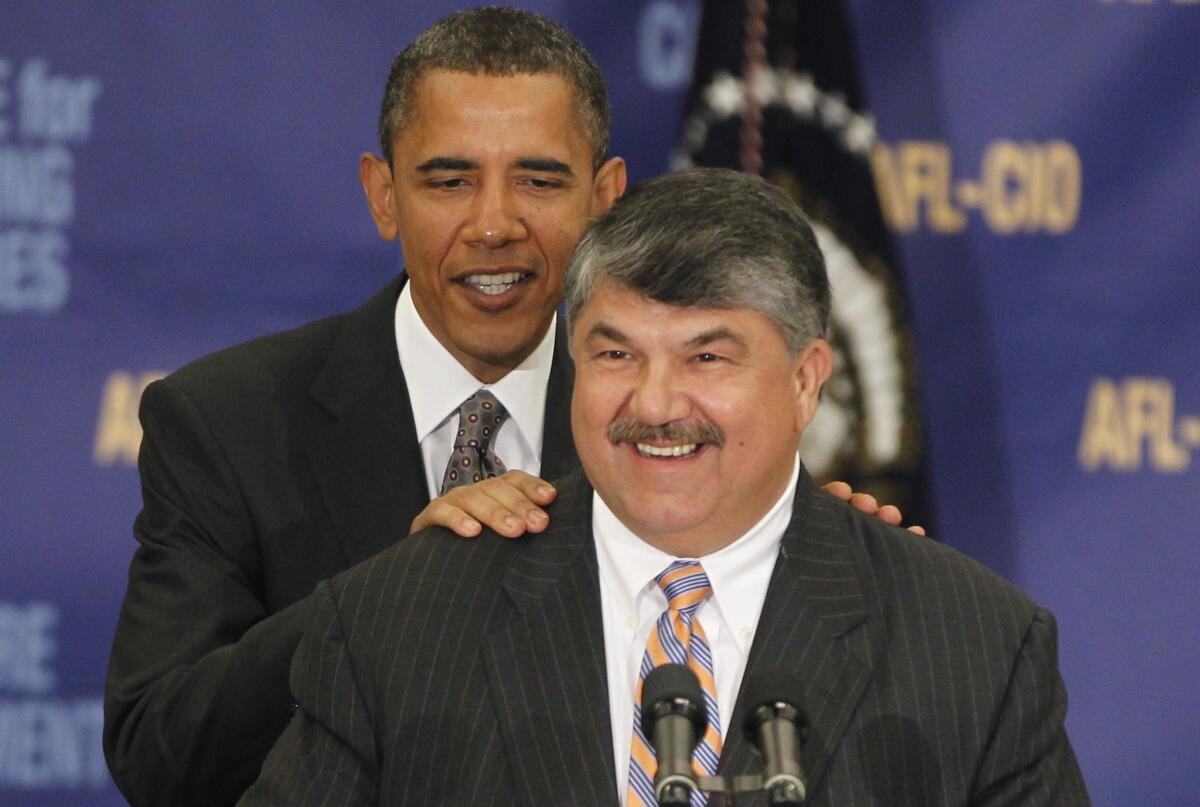NLRB gives labor a major win in subcontractor case

AFL–CIO President Richard Trumka, front, who praised Thursday’s pro-labor NLRB ruling, introduces President Obama at the union’s winter meeting in 2012.
- Share via
As expected, the National Labor Relations Board on Thursday gave workers a major victory in a case over who’s the boss when a big company hires a labor subcontractor to manage its workforce.
The new ruling has implications for a wide range of modern employment arrangements that leave workers wondering who’s the boss. These include franchise arrangements in which employees toil for big fast-food corporations but are nominally employed by small businesses operating stores; McDonald’s is the target of a whole sheaf of cases before the NLRB on that issue. You can expect employer groups to fight the new ruling, which materially broadens the definition of “employer,” in court.
We reported on this case last Sunday. It involved a couple hundred sorters and other blue-collar workers who were nominally employed by a labor outsourcing firm, Leadpoint, at a landfill and recycling center in the Silicon Valley town of Milpitas operated by a larger company, Republic Services. The Teamsters union maintained that Republic and Leadpoint were joint employers, which would allow the union to organize them under a contract it has for 60 Republic employees. Republic maintained that it had no authority over the Leadpoint employees.
The NLRB, in a 3-2 vote along party lines, with Democrats in the majority, found that Republic had enough authority over the wages and working conditions of the Leadpoint workforce to count as a co-employer. The decision elicited praise from the AFL-CIO, whose president, Richard Trumka, stated that it enhances workers’ collective bargaining rights by ensuring that “all parties who control their wages and other conditions of employment” are at the bargaining table. “This decision may very well signal the beginning of the end of outdated laws that fail to address an economic structure tilted against working people.”
The pro-employer Competitive Enterprise Institute, by contrast, called it “yet another decision by unelected regulators” and predicted it will have a “devastating impact on American employers and employees” by hurting “anyone who now benefits from flexible work arrangements.” NLRB members may be “unelected,” by the way, but they’re nominated by the nation’s president and confirmed by the U.S. Senate.
The NLRB majority asserted that it’s exactly the proliferation of these “flexible work arrangements” that made the decision necessary. Not only has the number of “contingent” workers soared in recent years, but so has the number of occupations covered by the category. Subcontracting labor recruitment and employment is one of many ways that big companies have found to disavow responsibility for the people who perform their work.
In this case, which is titled Browning-Ferris after the former operator of the recycling center, which has since been merged into Republic, the NLRB found that Republic exercised extensive control over the Leadpoint workers. Republic set the standards for the Leadpoint workers’ training and qualifications, required hirees to pass its drug tests, and reserved the right to force Leadpoint to fire any worker the senior company didn’t like. Republic set the hours and productivity standards for the Leadpoint workers and established a pay cap for the workers.
Under an existing standard of joint employment dating back to the Reagan era, a joint employer would have to exercise more than “limited and routine” authority over a subcontractor’s employees. Harking back to definitions set in the original National Labor Relations Act of 1935, the board said that the “right to control” is sufficient -- and in this case, Republic’s “right to control is indisputable: and in some respects “unilateral.”
Keep up to date with the Economy Hub. Follow @hiltzikm on Twitter, see our Facebook page, or email [email protected].
More to Read
Inside the business of entertainment
The Wide Shot brings you news, analysis and insights on everything from streaming wars to production — and what it all means for the future.
You may occasionally receive promotional content from the Los Angeles Times.











